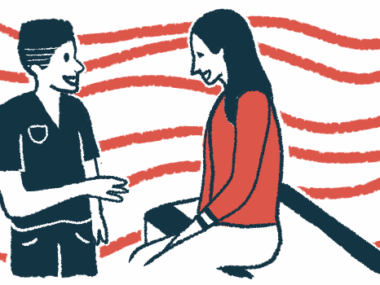Investigative Questions Are Essential to Caregiving
Written by |

My husband’s general practitioner, hematologist, and nephrologist each care for the same number of patients with aHUS as I do: one. However, these doctors all handle a few hundred other cases with various ailments and concerns, whereas this is the entirety of my practice.
Therefore, I am a specialist. I am not an expert in atypical hemolytic uremic syndrome (aHUS), but I specialize in this patient’s aHUS.
I monitor Ronald’s temperature, blood pressure, and blood sugar regularly. The medical charts show the standard range for a man of his age, height, and weight. But they don’t show his normal range. I know that by heart — because my heart loves this patient.
I know what he eats, how much, and when. As his constant companion, I note intuitively and daily his cycles of energy and fatigue, sleep, and insomnia. I prep his pills for the week and call in the refills. The doctors are on call 24/7 but as my husband’s caregiver and advocate, I am always on duty.
A well-read woman
Sure, the doctors study the technical articles I skim, the ones with the big words I can’t pronounce. They can even understand those molecular diagrams that look like quilt patterns to me. But I read — and understand — my patient’s habits and moods.
The doctors trust me to know when to call and reschedule his blood work for tomorrow instead of waiting another two weeks. And I trust them to know how to read and understand the results. We make a good team.
Team Ronald
When the COVID-19 vaccines became available, aHUS patients qualified as high risk for infection and my husband was invited to make an early appointment. We hesitated, though, as there was little data available to the general public and almost none regarding specific concerns of persons with this rare disease.
Initially, the doctors could only tell us there were no contraindications to aHUS patients getting the vaccine. Then, I read about an aHUS relapse triggered by COVID-19 and a few weeks later about the difficulty of studying the efficacy of the vaccine in rare disease patients.
The more I read, the less we understood. We had a decision to make and it was time to huddle with the team. I scheduled calls and visits with the doctors, printed out copies of online articles from medical journals, and compiled a list of questions.
Inquiring minds want to know
An article on the National Institutes of Health website notes that “complementopathies, such as atypical hemolytic uremic syndrome (aHUS) … share many clinical features with severe COVID-19 infection.”
I wanted to know:
- If the two diseases share some features, is an aHUS patient more vulnerable to COVID-19 or better equipped to fight it?
- How dangerous is COVID-19 to aHUS patients? Could it trigger a relapse in my patient?
- What are the known risks of the vaccines to aHUS patients? Any possibility they could trigger an episode?
- Is one of the vaccines safer than the others for aHUS patients?
- Could the overactive immune system of my aHUS patient possibly have conquered asymptomatic COVID-19 already? Can he be tested for antibodies first, to determine if the vaccine is unnecessary?
An article from the American Society for Clinical Investigations reported on two European trials that studied the use of eculizumab as a treatment for COVID-19.I wanted to know:
- If eculizumab might help fight a COVID-19 infection, could it possibly help prevent one?
- If an aHUS patient chooses to get the vaccine while using eculizumab, should it be at a certain time in their infusion schedule?
- If an aHUS patient is not currently on eculizumab, should s/he get a dose prior to taking the vaccine?
Questions are the answer
The answers and opinions we received are not necessarily applicable to other aHUS patients. Individual health situations differ greatly and the medical knowledge about COVID-19 and the vaccines will likely evolve. So, I share just the questions, in order to encourage other caregivers and patients to ask their own team of doctors what they want to know.
I also would like to share some encouraging information I stumbled across in an article on a promising method to stop COVID-19 infection. According to the director of hematology at Johns Hopkins University School of Medicine, there are a number of complement-inhibiting drugs “that will be FDA-approved and in clinical practice within the next two years.” Although motivated by a search for a cure for COVID-19, this is potentially good news for everyone on Team Ronald, as well as for all aHUS patients!






Leave a comment
Fill in the required fields to post. Your email address will not be published.